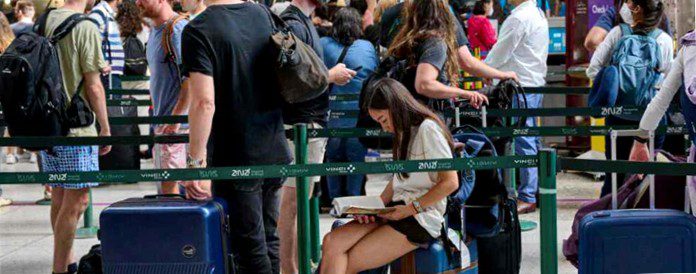
Travelers crowd the 09. July 2022 in Lisbon, Portugal, in the departure hall of Terminal 1 while waiting in line at the check-in counters of Humberto Delgado International Airport.
Horacio Villalobos#Corbis/Corbis via Getty Images
- It was the summer of travel chaos as flights were delayed and canceled while luggage disappeared.
- Many factors have led to the current situation, including weather and the war in Ukraine.
- Airlines also let many workers retire early, have training backlog and burned out flight attendants.
If you've thought at all about traveling this summer, you've probably heard at least one horror story.
Bags disappear into the ether or command their own flights. Planes are rebooked to depart from different countries. In June alone, thousands of flights were canceled and delayed.
Some of this is due to things beyond the airlines' control, like the weather and the ongoing economic impact of the war in Ukraine. But today's situation is also due to some pandemic-era measures – exacerbated by pre-pandemic trends.
Airlines opted to retire many people early during the pandemic
When the pandemic hit the airline industry, travel collapsed. Airlines, like many sectors, received financial assistance to stay afloat and keep workers paid. But with less customer interest in flying, airlines lowered costs – and many offered workers the option to retire earlyas funding expired between stimulus packages.
At Delta, for example, nearly 2.000 pilots signed up for early retirement.
"It's easy to have a revisionist history and wonder whether or not we should have done this," Delta CEO Ed Bastian said in the company's recent conference call. But, he said, there was "no knowledge" about when a vaccine would be found, and "the world would begin to reunite".
"I don't regret these decisions at all," Bastian said. But the pilots who left were at higher levels, he said, and that "causes churn at a much higher level".
There is a training backlog, and training costs a lot of money
To become a pilot, of course, you have to be trained. And the training costs a lot of time and a lot of money – this has been an issue for years.
According to NPR, training can cost a prospective pilot $80.000 to even more than $100.000. A commercial pilot in New Jersey told Insider's Kim Dahlgren that her flight school charges about 80.000 US dollars had cost.
"There are not enough educational institutions. The existing ones are "overbooked," said Faye Malarkey Black, president of the Regional Airline Association (RAA), NPR's Alejandra Marquez Janse said. There also isn't enough "financial support for individuals who want to become pilots," Black told NPR.
Some airlines are now stepping in to help defray the costs. United, for example, has opened its own flight school, which places special emphasis on making flying accessible to women and people of color. As of June, there were about 120 students enrolled at the Aviate Academy.
The program covers the cost of training to become a private pilot without a license, according to Unitedand scholarships and loans are available to help offset the cost – which is still 71.Be $250.
Flight attendants have to deal with abusive customers and harsh conditions
The Federal Aviation Administration said thatIn 2021, flight crews processed 5.981 recalcitrant passenger reports – a record number. From 12. July crews have been able to get away with 1.634 dealing with recalcitrant passenger reports.
This stubborn recalcitrance and aggression have left some flight attendants feeling burned out, Insider's Allana Akhtar reported. Some said flight attendants' mental health has deteriorated and wanted airlines to intervene with mental health support – and guidance on how to protect them.
And with workloads and travel chaos so high, airlines could do more to help flight attendants, says Sara Nelson, international president of the Association of Flight Attendants.
Nelson told Marketplace that airlines could add more operational support staff, who are the people on the other end of the phone when airline crews call.
"In some cases, crews online wait one, two, three, four hours to get in touch with someone," Nelson told Marketplace. "And for each person added, you get an additional support for about 500 people in the field trying to fill your flight."